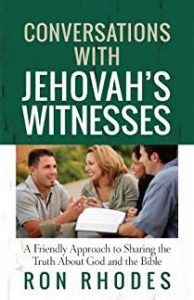This book concentrates primarily on witnessing techniques rather than on doctrine. Written to complement his 1993 book discussed below, 13 of the 20 chapters of the book consist of simulated conversations between Rhodes and a Jehovah’s Witness.
Rather than giving thorough explanations of the doctrinal differences, Rhodes refers the reader to pages in his 1993 book for additional information.
The book is structured as follows:
Part 1: The Basics of Tactical Conversing
Chapter 1: Why Effective Conversation Matters
Chapter 2: The Importance of Listening
Chapter 3: The Importance of Asking Questions
Chapter 4: The Importance of Effective Redirection
Chapter 5: The Importance of Avoiding Offense
Chapter 6: The Importance of Speech Peppered by Grace
Chapter 7: The Importance of Your Testimony
Part 2: Conversations on the Big Issues
Chapter 8: Conversations About the Watchtower Society
Chapter 9: Conversations About the New World Translation
Chapter 10: Conversations About Jehovah
Chapter 11: Conversations About Jesus and the Archangel Michael
Chapter 12: Conversations About Jesus and Jehovah
Chapter 13: Conversations About Jesus’s Crucifixion
Chapter 14: Conversations About Jesus’s Resurrection
Chapter 15: Conversations About Jesus’s Second Coming
Chapter 16: Conversations About the Holy Spirit
Chapter 17: Conversations About the Trinity
Chapter 18: Conversations About the Anointed Class and Other Sheep
Chapter 19: Conversations About Salvation
Chapter 20: Conversations About Soul Sleep and Hell
Postscript: A Challenge
Strengths:
In Chapter 3, Rhodes sets out his general policy for conversing with Jehovah’s Witnesses:
- Challenge the trustworthiness of the Watchtower Society
- Correct their wrong view of at least one major doctrine
In Chapter 4, he stresses the importance of not causing unnecessary offense and quotes a number of Scriptures about guarding one’s tongue.
With regard to Chapter 7, although I have not usually found it helpful to give my personal testimony (Witnesses usually discount our testimony, thinking we have been deceived by Satan), Rhodes stresses the importance of conveying that the Christian life isn’t a matter of devotion to a cause, but to a Person. It’s a personal relationship with Christ from which all genuine spirituality flows. To Rhodes’ points, I would add that it’s also important to make clear that being a Christian isn’t a matter of joining the “right” organization or following a set of rules.
Of necessity, the “conversations” in the book are simulated, not transcripts of actual encounters. However, the structure of the chapters is very helpful:
- An explanation of why the topic is important
- Falsehoods to look for (erroneous Watchtower claims and assumptions)
- Important points to introduce (what Rhodes is trying to get across)
- Eavesdropping on a Conversation (the simulated conversation itself)
- Conversation highlights (witnessing techniques Rhodes used)
- Digging Deeper (references to related pages in Rhodes’ 458-page 1993 book, Reasoning From the Scriptures with the Jehovah’s Witnesses)
Limitations:
Notice that Conversations with Jehovah’s Witnesses doesn’t contain conversations about the Watchtower’s unreliability—false prophecies, doctrinal changes, changed medical directives, or strange teachings. In fact, in Chapter 4, Rhodes recommends that you steer clear of peripheral doctrines as much as possible and redirect the conversations towards the person, nature, and work of Christ.
If you’ve read my other articles in this series, you’ll see that Rhodes differs with David Reed and Don Cameron on this point. I’m not saying this is a problem. I’m merely pointing out that you find a different philosophy in this book.
I try to take the best from all these writers. Not all Jehovah’s Witnesses are the same. Different approaches work with different. If what you try is working, keep on. If it doesn’t, try something else.
Click to BUY on Amazon.com
This page contains associate links – as an Amazon Associate I earn a small percentage from qualifying purchases.
Your turn:
Do you believe studying Rhodes’ simulated conversations would help you in your own interactions with Jehovah’s Witnesses?
Share your thoughts in the comments.


Leave a Reply
Be the First to Comment!